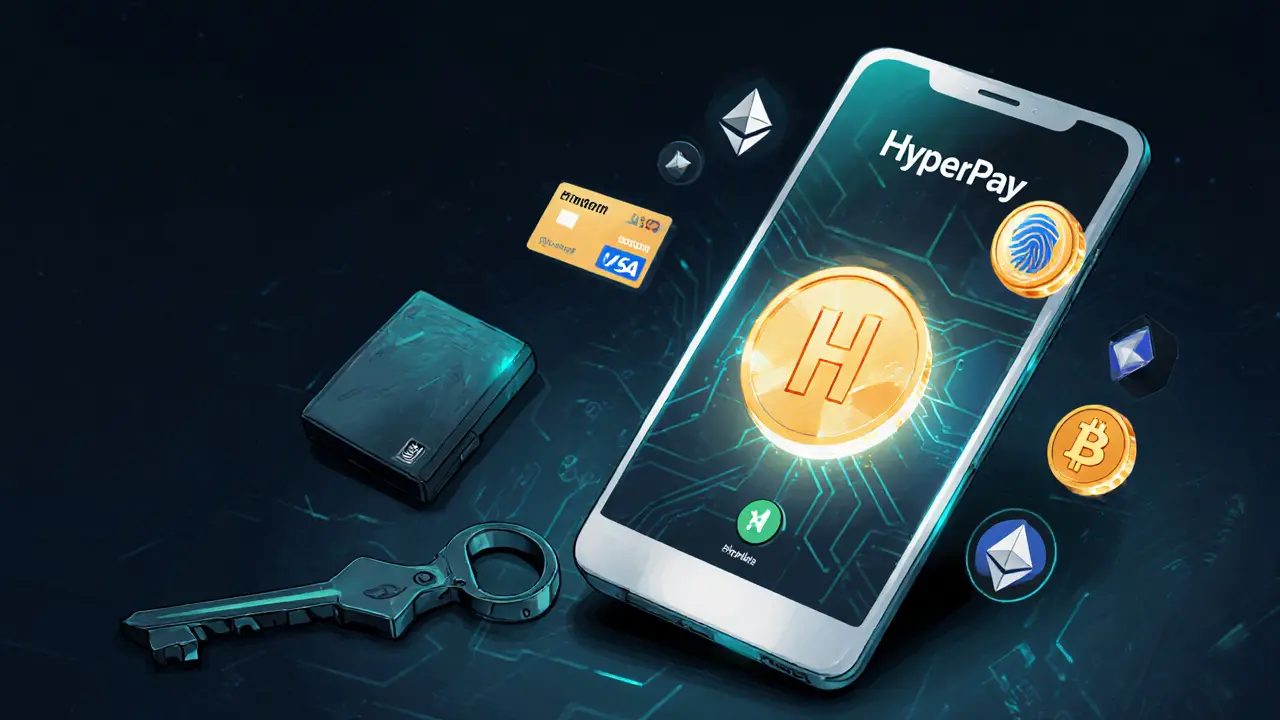HyperPay Wallet Fee Calculator
HPY Transaction Cost Analysis
Calculate your real transaction costs when using HyperPay Wallet. HPY tokens reduce fees for enterprise users, but only for specific services.
Transaction Analysis
HPY Token ValueEnter transaction details to see your cost comparison.
Hyper Pay (HPY) isn't just another crypto coin. It's a token built for one thing: powering a digital wallet ecosystem. But here's the catch - most people don't use HPY to buy coffee or trade on exchanges. They use it inside the HyperPay Wallet app, where it acts as the engine for payments, security features, and enterprise services. If you're wondering if HPY is worth your time, the answer isn't about price. It's about whether you need a wallet that works like a bank vault with a credit card attached.
What Exactly Is Hyper Pay (HPY)?
Hyper Pay (HPY) is the native token of the HyperPay Wallet platform, launched in 2018 by HyperBC. Unlike Bitcoin or Ethereum, HPY doesn't exist to be traded for profit. It's a utility token - meaning it has a job inside a specific system. In this case, that system is a multi-chain crypto wallet with hardware security, enterprise compliance, and a built-in payment card.
The total supply of HPY is fixed at 2.65 billion tokens. That’s a lot. But here’s the twist: as of October 2025, less than 3% of those tokens are actively circulating. Most are locked in corporate accounts, staking pools, or reserved for future enterprise use. That’s why its market cap sits around $900,000 - tiny compared to wallets like MetaMask or Trust Wallet, which have market caps in the hundreds of millions.
HPY trades on just one major exchange: CoinW, in the HPY/USDT pair. Other exchanges like Binance and Coinbase don’t list it. That’s not an accident. HyperBC isn’t trying to compete with Coinbase or Kraken. They’re targeting businesses that need secure, compliant custody solutions - especially in places like Dubai and Singapore, where they hold official Virtual Asset Service Provider (VASP) licenses.
How Does the HyperPay Wallet Work?
The real product isn’t HPY. It’s the HyperPay Wallet. Think of HPY as the fuel that keeps the wallet running. The wallet has three main parts:
- HyperPay Wallet (App): A mobile app for iOS and Android that stores your private keys locally - meaning only you control them. It supports over 10 blockchains, including Bitcoin, Ethereum, and BSC, and lets you swap between them in one click.
- HyperMate (Hardware Wallet): A physical device that looks like a USB stick. It has a fingerprint scanner and military-grade encryption chips. You pair it with the app to sign transactions. It costs $99 and is the only hardware wallet of its kind tied to a mobile app.
- Hyper Pay Credit Card: A physical or virtual card that lets you spend your crypto directly. You convert HPY or other coins to fiat (like USD or EUR) and load the card. Fees are high - around 3.8% per transaction - but it works in places where crypto cards aren’t common.
Security is where Hyper Pay shines. It uses post-quantum encryption - a technology designed to resist future attacks from quantum computers. Most wallets still use standard AES-256. HyperBC claims this gives them an edge for institutional clients worried about long-term asset safety. They’re also ISO 27001 certified, which is a gold standard for data security in finance.
Who Actually Uses HPY?
If you’re an individual crypto user, you probably won’t use HPY. There are easier, cheaper, and more flexible wallets out there. MetaMask is free, supports over 200,000 tokens, and connects to every DeFi app. Trust Wallet has 10x the users and integrates with Binance’s ecosystem.
But if you run a small business in the Middle East or Southeast Asia - and you accept crypto payments - Hyper Pay becomes interesting. Why? Because it’s one of the few wallets that combines:
- Regulated custody (licensed in Dubai and Singapore)
- Hardware security for team access
- Accounting integrations with SAP and Oracle NetSuite (coming in Q1 2024)
- A payment card that converts crypto to local currency
According to SimilarWeb data, 68% of HyperPay Wallet users come from corporate IP addresses. That’s not a coincidence. This isn’t a consumer app. It’s a B2B tool dressed up like a wallet.

Why Is HPY’s Price So Low?
HPY hit an all-time high of $0.04024 in April 2018. As of October 2025, it trades at $0.000315 - a 99.2% drop. That sounds terrible. But here’s the reality: HPY was never meant to be a speculative asset.
When you buy HPY, you’re not betting on its price going up. You’re buying access to the wallet’s premium features. For example, paying transaction fees in HPY gives you discounts. Holding HPY unlocks higher card spending limits. Enterprise clients pay in HPY to access custody services. The token’s value is tied to usage - not hype.
That’s why its price hasn’t recovered. There’s no big marketing push. No celebrity endorsements. No viral meme. Just a quiet team building tools for businesses that need compliance, not coin flips.
What Are the Downsides?
Hyper Pay isn’t perfect. Here’s what users complain about:
- App crashes: Android 13 users report frequent crashes, especially when using Bluetooth with HyperMate.
- Slow support: Customer service takes 72+ hours to respond, according to Trustpilot reviews.
- High fees: The credit card charges 3.8% per transaction. Coinbase’s card is 1.49%.
- Limited tokens: Only 27 cryptocurrencies supported. MetaMask supports over 200,000.
- Dead community: The official Telegram group has dropped from 12,500 members to 8,247 since early 2023. GitHub hasn’t seen a commit since September 2022.
Experts are split. Dr. Sarah Chen from MIT says the post-quantum encryption is “technically sound but premature.” Crypto analyst Alex Wong calls the tokenomics “unsustainable.” But the real issue isn’t tech - it’s momentum. While MetaMask and Trust Wallet keep adding DeFi integrations, Hyper Pay is stuck in enterprise mode.

Should You Buy HPY?
If you’re looking to make money off HPY - don’t. It’s not a growth stock. It’s a niche utility token with no real trading volume and no clear path to mass adoption.
If you’re a small business owner in a regulated market and you need:
- A secure way to hold crypto for your company
- A hardware wallet for your team
- A card to pay suppliers in fiat
- Compliance documentation for audits
Then Hyper Pay might be worth testing. Download the app. Try the free version. See if the features fit your workflow. You don’t need to buy HPY to use it - you can pay fees in other coins.
But if you’re a casual crypto holder, stick with MetaMask, Trust Wallet, or Coinbase Wallet. They’re free, faster, and have way more tools. HPY isn’t for you.
What’s Next for Hyper Pay?
The roadmap is simple: focus on enterprises. The October 2025 update confirms two things:
- Integration with SAP and Oracle NetSuite (Q1 2024)
- Basic DeFi tools for institutional investors (no timeline)
No plans to list on Binance. No plans to add more tokens. No plans to fix the mobile app’s bugs. That tells you everything. HyperBC isn’t chasing users. They’re chasing contracts.
Will HPY survive? Maybe. But not because of its price. Because of its compliance. If regulations tighten globally - and they will - companies will need wallets like Hyper Pay. Not because they’re cool. Because they’re legal.
For now, HPY is a quiet player in a loud space. It doesn’t shout. It doesn’t trend. But if you’re running a business that needs to hold crypto safely - it’s one of the few options that actually answers the question: How do I do this without getting fined?
Is Hyper Pay (HPY) a good investment?
No, HPY is not a good investment for speculation. Its price has dropped 99.2% since 2018 and shows no signs of rebounding. It’s a utility token meant for use within the HyperPay Wallet ecosystem, not for trading. Its value comes from usage - like paying fees or unlocking features - not from price growth.
Can I use HPY to buy things online?
Not directly. You can’t use HPY to pay at Amazon or eBay. But you can convert HPY (or other crypto) into fiat using the Hyper Pay Credit Card, then spend it anywhere Visa is accepted. The catch? The card charges up to 3.8% per transaction - much higher than competitors like Coinbase or Crypto.com.
Is Hyper Pay Wallet safe?
Yes, for enterprise use. The HyperPay Wallet stores private keys locally on your device, uses military-grade hardware (HyperMate), and is ISO 27001 certified. It also includes post-quantum encryption - a rare feature. But for average users, the app is buggy and customer support is slow. It’s safer than some random wallet, but not as polished as MetaMask or Trust Wallet.
Where can I buy HPY?
HPY is only listed on one major exchange: CoinW (HPY/USDT pair). It’s not available on Binance, Coinbase, Kraken, or any other top-tier exchange. If you want to buy it, you’ll need to sign up on CoinW, deposit USDT, and trade for HPY. Be aware that liquidity is extremely low - you may struggle to sell quickly.
Does Hyper Pay support DeFi or staking?
Not for regular users. The wallet doesn’t connect to Uniswap, Aave, or other DeFi platforms. There are no staking options in the app. The only DeFi features being developed are for institutional clients - and even those are still in planning. If you want to earn interest on crypto, use a platform like Celsius or Nexo instead.
What’s the difference between HPY and HyperPay Wallet?
HPY is the token. HyperPay Wallet is the app and ecosystem. Think of HPY like gasoline - it powers the system. You can use the wallet without buying HPY, but you’ll pay higher fees. If you buy HPY, you get discounts on transactions, higher card limits, and access to enterprise features. The wallet is the product. HPY is just the currency inside it.
Is Hyper Pay regulated?
Yes, but only in specific regions. HyperBC, the company behind Hyper Pay, holds Virtual Asset Service Provider (VASP) licenses in Dubai and Singapore. That means it complies with local anti-money laundering and KYC rules. It’s not regulated in the U.S., EU, or Australia. If you’re in those regions, you’re using it at your own risk.

Really appreciate this breakdown. Most people think crypto is all about speculation, but this is a rare case where the token actually serves a purpose. If you're running a small business in Dubai or Singapore and need compliant custody, HyperPay might be one of the only tools that doesn't make your accountant scream.
They're not building a wallet. They're building a backdoor for the surveillance state. Post-quantum encryption? Please. That's just code for 'we're working with intelligence agencies'. And why is 97% of the supply locked? Because they're rugpulling in slow motion. Watch this coin go to zero when the SEC finally cracks down.
LOL this is the most boring crypto project ever. No memes, no influencers, no pump. Just a bunch of accountants in suits using a wallet that crashes on Android 13. And they charge 3.8%? My dog could make a better card. Why does this even exist?
This is not for normal people. This is for companies who need paperwork. If you are just holding crypto, use MetaMask. This is like buying a Ferrari to go to the grocery store.
Okay I’ll admit I was skeptical at first, but after reading this I think HyperPay might actually be quietly revolutionary. The fact that they’re focusing on enterprise compliance and post-quantum encryption is genius - most projects are chasing hype while ignoring the real problem: long-term security. And yeah, the app crashes, support is slow, fees are high - but if you’re a small business owner in a regulated market, you don’t care about those things as much as you care about not getting shut down by regulators. This isn’t sexy, but it’s necessary. I’ve been using the free version for my LLC and honestly? It’s been a lifesaver for audit prep. No need to buy HPY to use it - just pay fees in USDT. But if you hold it, you get discounts. It’s a weird model, but it works.
The real question isn’t whether HPY has value - it’s whether we’ve misunderstood value itself. We’ve been trained to equate price with worth. But here, worth is embedded in utility, not speculation. The token’s decline isn’t failure - it’s clarity. This isn’t a coin for the crowd. It’s a tool for the careful. The market doesn’t reward patience anymore - but maybe it should.
Let’s be real - this is a graveyard disguised as a product. 8k Telegram members? No commits since 2022? A card that charges 3.8%? And you’re telling me this is the future? The only thing ‘post-quantum’ here is the delusion of its founders. If this were a startup in Silicon Valley, it would’ve died in 2020. The fact that it’s still alive means one thing: regulatory capture. They’re not winning because they’re better - they’re surviving because they bribed the right people in Dubai. Don’t be fooled by the ISO certification. That’s just a fancy stamp on a sinking ship.
Wait so you can use the wallet without buying HPY? So why does the token even exist? Like… what’s the point of having a token if you don’t need it? That feels like a scam.
Ugh. Another ‘enterprise-grade’ crypto project. So boring. I mean, who even uses SAP in 2025? And post-quantum encryption? Honey, quantum computers are still in labs. This is like wearing a spacesuit to the grocery store. 🙄
Interesting… but I have to ask - if HPY is just a utility token, why is it even listed on CoinW? If no one’s trading it, why does the exchange bother? And if the team isn’t adding new tokens or fixing bugs, why should anyone trust their roadmap? It feels… hollow.
They’re not building a wallet. They’re building a Trojan horse for the global financial elite. You think this is about compliance? No. It’s about control. They want to make sure only the right people - the ones who play by their rules - can hold crypto. And that’s why they’re targeting Dubai and Singapore. They’re creating a gated community for the rich. Meanwhile, you and I are stuck with buggy apps and 3.8% fees. This isn’t innovation. It’s exclusion.
They’re working with intelligence agencies. You think they’d let a random guy from Ohio use a hardware wallet with military-grade encryption? No way. This is a front for asset tracking. And that locked supply? That’s not corporate reserves - that’s their backdoor stash. You’re being played. This isn’t crypto. It’s surveillance with a blockchain label.
For anyone wondering if this is worth trying: start with the free version. Don’t buy HPY. Just use it. See if the card works. See if the app crashes less than once a day. If you’re a small business owner in a country with shaky crypto laws, this might be the safest option you’ve got - even if it’s clunky. It’s not perfect, but it’s better than nothing.
HPY is dead. The app is broken. The community is gone. The team stopped coding. The card is expensive. The only reason this still exists is because of regulatory loopholes in Dubai. This isn’t a product. It’s a legal loophole dressed up as innovation. Don’t waste your time.
Look, I don’t care if it’s boring. If you need to pay your suppliers in crypto and not get audited into oblivion, this might be the only tool that works. Yeah it’s slow. Yeah the app crashes. But if it keeps your business out of jail, isn’t that worth it?
Tokenomics are a joke. Fixed supply, 97% locked, zero volume. The only thing keeping this alive is the illusion of utility. Real utility doesn’t need a token. Real utility just works. This is vaporware with a compliance badge.
Everyone’s acting like this is some underground gem. Nah. This is the crypto equivalent of a government-issued ID card. You don’t want it unless you’re forced to have it. And if you’re forced to use it? You’re already losing.
wait so the wallet works without hpY? then why is the token even a thing? did they just make up a coin for no reason?